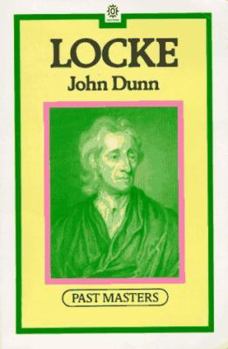Locke
(Part of the Very Short Introductions Series and Oxford's Very Short Introductions series Series)
Select Format
Select Condition 
Book Overview
John Locke (1632-1704) argued in his masterpiece, An Essay Concerning Human Understanding, that our knowledge is founded on experience and reaches us principally through our senses; but its message has been curiously misunderstood. In this book John Dunn shows how Locke arrived at his theory of knowledge, and how his exposition of the liberal values of toleration and responsible government formed the backjbone of enlightened European thought of the...
Format:Paperback
Language:English
ISBN:0192875604
ISBN13:9780192875600
Release Date:September 1984
Publisher:Oxford University Press, USA
Length:112 Pages
Weight:0.22 lbs.
Dimensions:0.3" x 5.1" x 7.6"
Customer Reviews
1 rating
An excellent introduction to the work
Published by Thriftbooks.com User , 19 years ago
This is an excellent introduction to the work of Locke, but is deficient in its telling of Locke's life story. It does trace the story of his public life and career. It tells of his long preparation in politics his work for Shaftesbury, his many friendships with political figures and thinkers not only from Britain but from Holland and France; it tells of the four years of political exile in which he wrote his masterpiece " An Essay on Human Understanding" tells of the fame this book brought him, and his public career afterwards- but it tells almost nothing of his emotional and intimate life. This may not be the main thing, but as Ben- Ami Scharfstein has shown in his work on the lives of the great Philosophers- understanding the life may provide key insights into the work. Locke never married but he did have one significant long- term relationship with the woman who was his best friend intellectual companion and confidante, Damaris Cudworth, later Lady Masham. Dunn ably explores Locke's championing of the value of religious tolerance( for dissenting sects of Protestants but not for Catholics) his pioneering efforts at basing human understanding on knowledge given by the senses. He shows how for Locke " knowledge itself is a form of perception" He shows where Locke contradicted the teachings of the one from whom he had learned so much Descartes, especially on the matter of innate knowledge. For Locke the mind is a ' tabula rasa' at the beginning, and all we know we know through our experience. Knowledge which is the perception ' of the connexion and agreement, or disagreement and repugnancy of any of our ideas" is for Locke always " particular ideas existing in our own minds". Locke's insistence on verbal clarity, his insistence on the role the senses play in " furnishing men with the knowledge of nature , " are still Dunn claims valuable today. Dunn too shows where Locke is more pessimistic about our power of understanding especially in regard to the way the power of custom, the ' elaborate process through which men form, modify and protect their beliefs" and the " unedifying character of most worldly desires" lead to distortion in perception and thought. Nonetheless Locke stands as the great forerunner in major changes in the human perception of the individual's power to know and right to believe. He is the pioneer of those ideas which would be embodied in the American Declaration of Independance and Constitution. It is possible to argue that he is one of the few of the great philosophers whose work can be said to have done some real good in the world. This is a very clearly written study and a highly valuable introduction to his thought.






